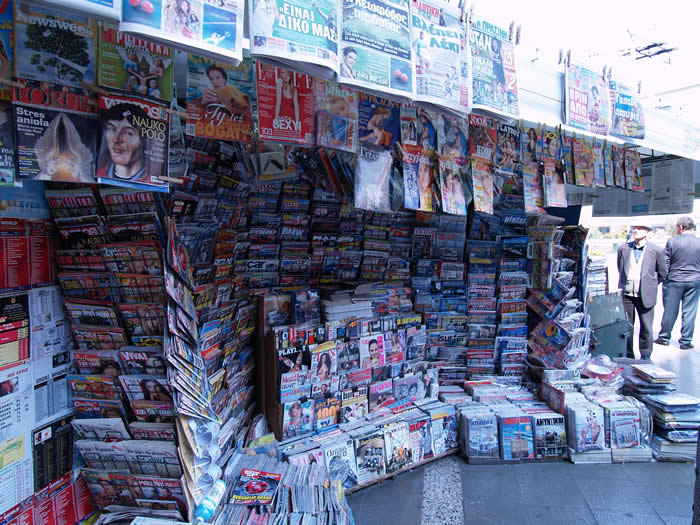The End of Print Media
 Mark Dillen‘s precis of recent developments in the news media is staggering:
Mark Dillen‘s precis of recent developments in the news media is staggering:
The news out of Philadelphia is that there is no news — no newspapers, that is. The Philadelphia Inquirer and the Philadelphia Daily News have joined the swelling ranks of American print media that have gone bankrupt. Last month, it was the Star Tribune of Minneapolis. Late last year, the Los Angeles Times and Chicago Tribune, owned by the same parent, declared their insolvency. The two newspapers in Detroit, the News and the Free Press, now have home delivery only three days a week. The print version of the Washington Post is stagnant. Even the colossus of American journalism, the New York Times, no longer stands so tall, as several accounts have noted. In its own peculiarly self-conscious way, the NYT recently reported on its own economic plight, although its senior management refused to comment (!) to its own reporter on the company’s travails.
Internationally, the situation is not that much different. The wired world is reading fewer newspapers and, as publishers compensate by raising newstand prices, more readers are driven away. We are left with cable and satellite television, Internet media, and other evolving approaches.
I’ve been vaguely aware of all these developments, of course, but seeing them aggregated so succinctly adds some perspective. Granted, bankruptcy is not the same as “out of business,” so many of those papers are still around. Whether that’ll be the case in the longer run, though, is doubtful.
This all has implications for US public diplomacy, too, which is the actual point of Dillen’s setup.
(Why this post, dated Feb. 24, is just now showing up in my RSS reader, I dunno.)
Photo by Flickr user Giu Giu under Creative Commons license.






Print media’s still around?
The loss of print in books magazines and newspapers means the loss of historical perspective.These things have stood immutable in the face of those wishing to change history for centuries.
Their loss is tragic.
The past can now be changed with a keystroke.
None of those embarrassing witnesses in print,or those tedious book burnings.
How tidy!
A book shelf is cold storage, the Internet is a huge garbage can!
Each has enormous capacity to store information, but the loss of print simply makes the revisionist’s job that much easier.
The people can now be “re-VISIONed” at will,leaving everyone with an Orwellian view….”except pigs”
Yeah, all of that is true. But you forgot one component of this equation…..
People don’t want to preached to, in news articles and off the editorial page about what great intellectual sloths they are for just raising their families, paying their bills, going to church on Sunday, teaching their children right from wrong…etc…etc…
The transition from horse and buggy is a metaphor for today’s print media.
Just as the motorized society left less crap in the streets; the modern day media transition has led to at least a variety of what crap you want to mentally digest.
My prediction still stands – I think at some point, the Times is going to revert to a paid-subscription requirement for their on-line access, like what the Wall Street Journal has kept for much of their on-line newspaper (more specifically, the financial section). They’ll lose a lot of readers online because of that, but they’ll probably regain a steady source of income, and supplement that income when the print editions finally go moribund.
Tom Tomorrow actually has a funny, somewhat bitter-edged “This Modern World” comic on this that is pretty good.
After the media’s performance in the 2008 election – good riddance.
That article has a dateline of February 24. The Inqy has been delivered to my house every day since then, including this morning. So as a starting point, he is wrong on the specifics.
Indeed, they are only looking to the bankruptcy process to do two things so far — create a fiction that they are combining the Inqy and the Daily News into a single paper, mostly to reduce their annual cost to run AP stories, and cramdown the debt the owner took on when he bought the paper from McClatchy 2 years ago. The other methods of cost cutting, both towards the union pressmen and reducing head count in the writers’ room took place before bankruptcy.
I run into the local yokels complaining occasionally about being called by the Gainesville Sun to get a subscription. They describe how they lectured the poor telemarketer (who they didn’t understand was almost certainly not an employee of the paper, but some poor schlub at a call center making $8/hr) that “If ya’ll wouldn’t be suh lib’ral I’d get a subscription blah blah blah…” all this nonsense from some semi-literate redneck on his high horse.
Newspapers are dying primarily because their income depends on selling expensive, hard-to-search, local classifieds, and craigslist came along and destroyed that business model.
I’m of mixed feelings. On the one hand, I can now run lots of cheap, lengthy ads online, which is good for my math tutoring business, instead of having to pay hundreds a month for a scrawny classified ad. On the other hand, the big paper I used to live near, the Raleigh News and Observer, occasionally does really good investigative journalism, and that will disappear when they go out of business.
Yeah
But,
I used to live near, the Raleigh News and Observer, occasionally does really good investigative journalism, and that will disappear when they go out of business.
And yeah,
You would disappear from your current job if you took it on yourself to do a good job, occasionally.
Get a grip, the world is tough, if you can man up.